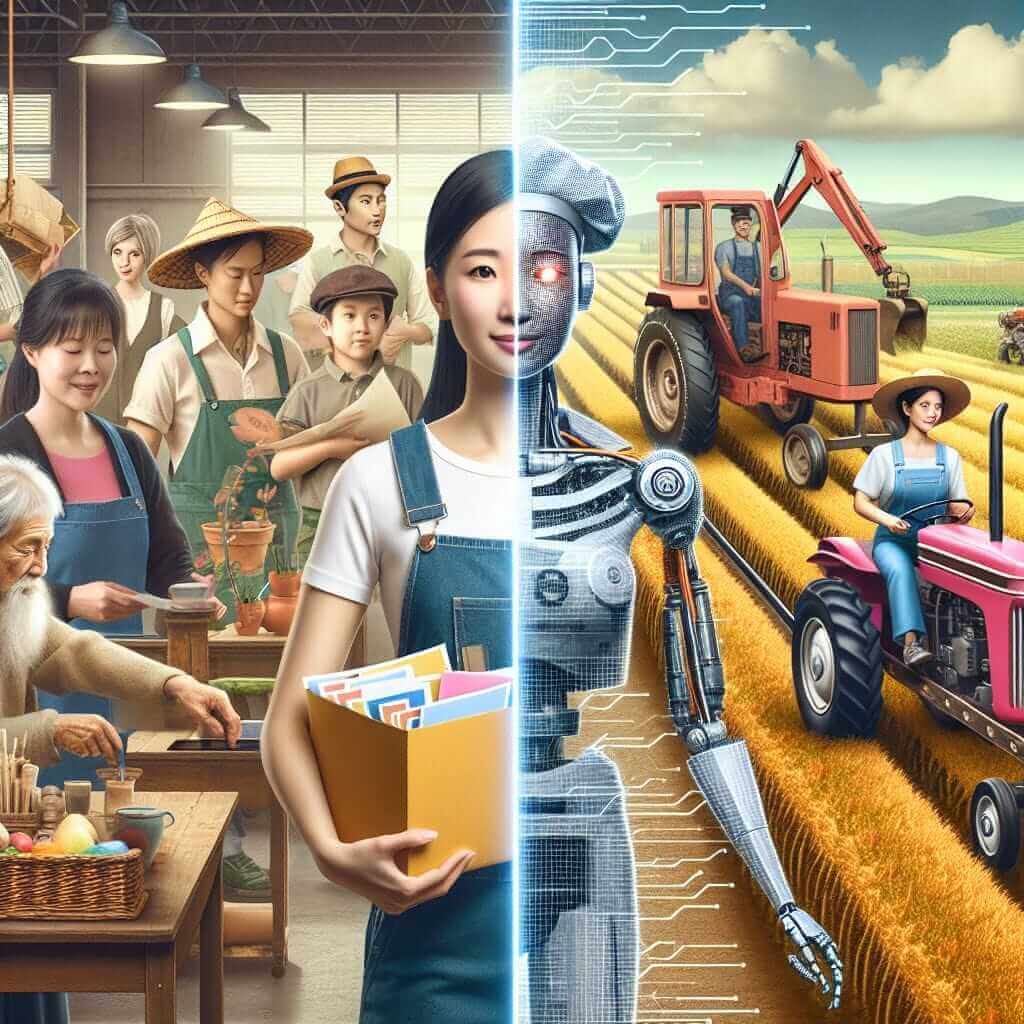The relentless march of digital technology has dramatically transformed numerous facets of modern life, including the labor market. This evolution has sparked considerable debate about its impact on traditional jobs, a topic that frequently surfaces in IELTS Writing Task 2. This essay will delve into the implications of digital technology on traditional jobs, equipping you with the insights and vocabulary to excel in your IELTS exam.
This topic often appears in the form of a problem/solution or advantages/disadvantages essay. Here are some potential IELTS Writing Task 2 questions you might encounter:
- To what extent do you agree or disagree that digital technology has had a negative impact on traditional jobs?
- Digital technology is rapidly replacing many traditional jobs. What are the advantages and disadvantages of this trend?
- Many people argue that governments should invest in training programs to help workers adapt to the changing job market. Discuss the advantages and disadvantages of this solution.
Sample Essay: Digital Technology and Traditional Jobs
Let’s examine a sample essay addressing the first question:
Question: To what extent do you agree or disagree that digital technology has had a negative impact on traditional jobs?
Essay:
Digital technology has undeniably revolutionized numerous aspects of our lives, including the way we work. This essay argues that while this technological revolution has brought about some negative consequences for traditional jobs, its overall impact is not entirely detrimental.
On the one hand, digital technology has led to the displacement of certain job sectors. Automation, driven by advancements in artificial intelligence and robotics, has enabled machines to perform tasks previously carried out by human workers, particularly in manufacturing and agriculture. This has resulted in job losses and economic hardship for those lacking the skills to adapt to the evolving demands of the digital age. For instance, the rise of online retail giants like Amazon has significantly impacted brick-and-mortar stores, leading to closures and job cuts in the retail sector.

On the other hand, digital technology has also created new opportunities and transformed traditional roles. The burgeoning tech industry itself generates a plethora of new jobs in fields such as software development, data analysis, and digital marketing. Furthermore, technology has facilitated the growth of the gig economy, offering individuals flexible work arrangements and the ability to leverage their skills online. Platforms like Uber and Upwork exemplify this trend, connecting workers with clients globally and creating income-generating opportunities.
Moreover, digital technology has enhanced efficiency and productivity across various sectors. Businesses can now automate tasks, streamline operations, and reach wider audiences through online platforms. This increased efficiency allows companies to offer goods and services at more competitive prices, ultimately benefiting consumers.
In conclusion, while digital technology has undoubtedly disrupted traditional job markets, leading to job displacement in certain sectors, it has simultaneously created new opportunities and fostered economic growth. Governments and educational institutions must prioritize equipping individuals with the necessary skills to thrive in this evolving landscape, ensuring that the benefits of technological advancement are accessible to all.
Word count: 274
Writing Tips
- Present a balanced view: Acknowledge both the positive and negative impacts of digital technology on traditional jobs.
- Provide specific examples: Support your arguments with relevant examples from various industries and sectors.
- Use appropriate vocabulary: Incorporate relevant terms like “automation,” “digital disruption,” “gig economy,” and “upskilling.”
- Structure your essay logically: Follow a clear structure with an introduction, body paragraphs, and a conclusion.
Difficult Vocabulary
- Automation (n.) /ˌɔː.təˈmeɪ.ʃən/: The use of machines and computers to do work that was previously done by people.
- Displacement (n.) /dɪˈspleɪs.mənt/: The situation in which people are forced to leave their homes or jobs.
- Gig economy (n.) /ˈɡɪɡ ɪˌkɒn.ə.mi/: A way of working that is based on people having temporary jobs or doing separate pieces of work, each paid separately, rather than having permanent jobs.
- Upskilling (n.) /ˈʌpˌskɪl.ɪŋ/: The process of learning new skills or of teaching workers new skills.
- Digital disruption (n.) /ˈdɪdʒ.ɪ.təl dɪsˈrʌp.ʃən/: The change that happens when new digital technologies and business models affect the way an industry or market operates.
Conclusion
The impact of digital technology on traditional jobs is a complex issue with both positive and negative facets. By understanding the nuances of this topic and using the vocabulary provided, you can confidently articulate your views in your IELTS Writing Task 2 and achieve a band 8 score. Remember to practice writing essays on similar topics to refine your skills and improve your writing fluency.